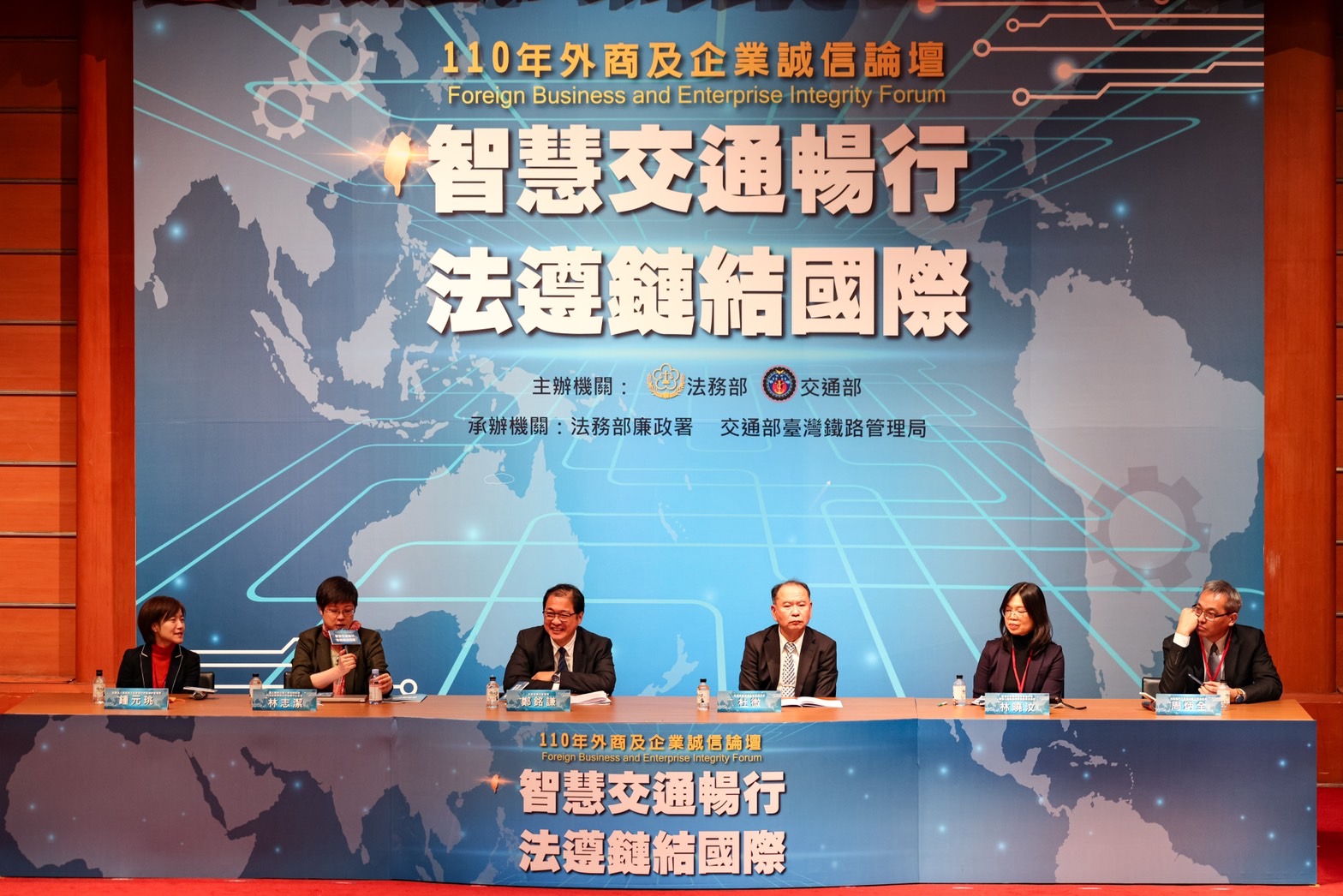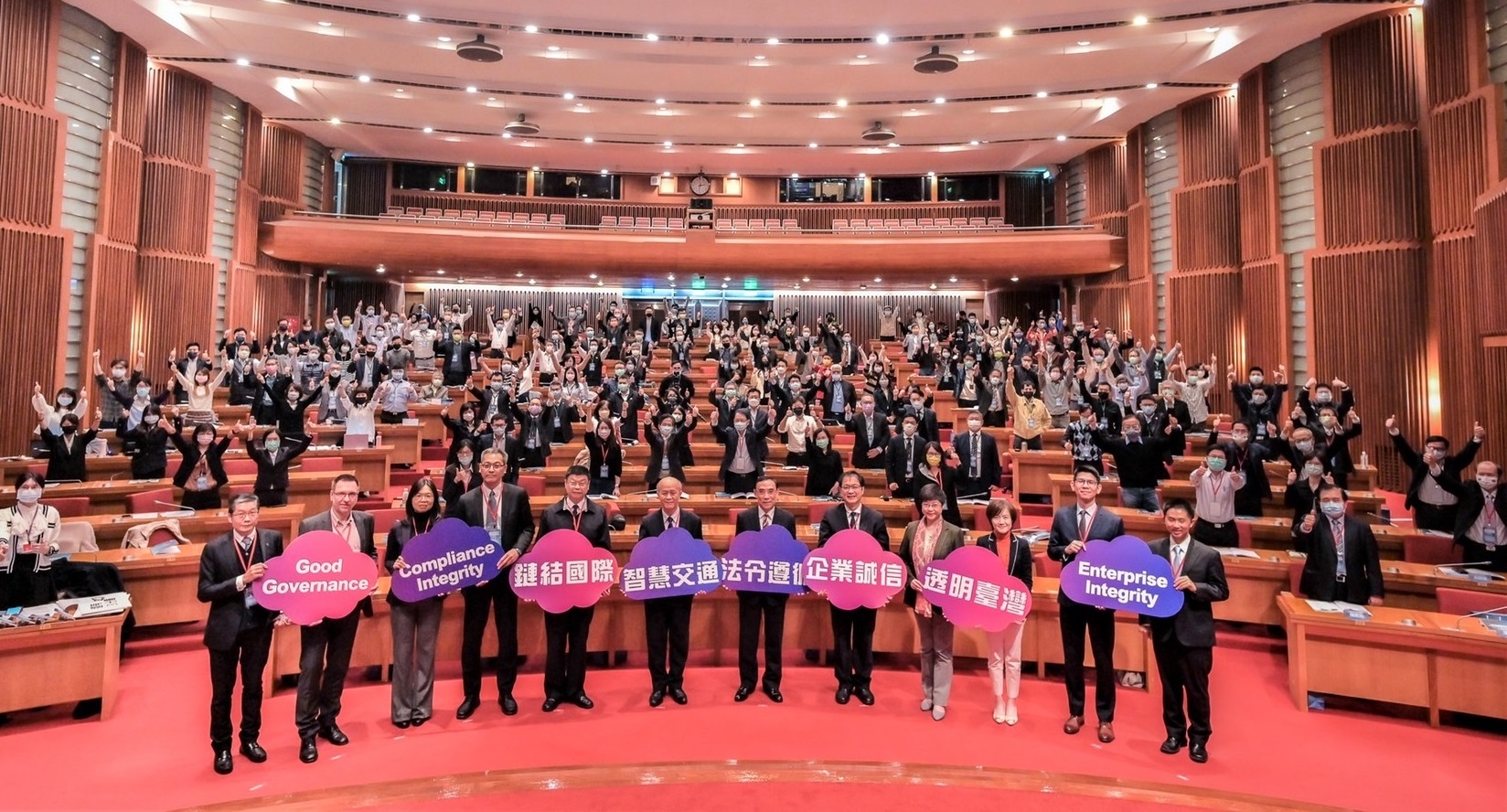Strengthening Mobility With Smart Transportation, Connecting Globally With Compliance
- Publication Date:
- Last updated:2021-12-08
- View count:2391

In response to Taiwan's high-tech industry’s focus on international trends, such as 5G, Vehicle-to-Everything(V2X) and Smart Cities, the Ministry of Justice and the Ministry of Transportation and Communications co-organized the “Strengthening Mobility With Smart Transportation, Connecting Globally With Compliance - 2021 Foreign Business and Enterprise Integrity Forum” at the National Central Library on November 24th 2021, inviting elites from the industry, government agencies, academic field and NGOs to share their experiences, exchange opinions and participate in discussions on integrity and compliance. Members from both foreign and domestic enterprises in the smart transportation system also were invited to attend. The forum attracted hundreds of senior managers and compliance officers, and with the positive response received during the forum, the event was a tremendous success.
The distinguished guests included Ching-Hsiang Tsai, Minister of Justice; Hsiang-Ling Hu, Political Deputy Minister of Transportation and Communications; Ming-Chian Cheng ,Director-General of Agency Against Corruption (AAC); Wei Tu, Director-General of Taiwan Railways Administration, MOTC; Philip Chou, General Counsel & Compliance Officer of Siemens Limited Taiwan; Chih-Chieh Lin, Professor of National Yang Ming Chiao Tung University; Vivienne Lin and Jimmy Lee, Directors of European Chamber of Commerce Taiwan (ECCT); Yuan-Yao Chung, Director of Taiwan Institute of Ethical Business and Forensics; Alfred Tsai, Director of American Chamber of Commerce in Taiwan (AmCham); Alfred Wu, Resident Director of National Democratic Institute (NDI); Irene Ho, Economic Specialist of American Institute in Taiwan (AIT) and etc. The public and private sectors gathered altogether to promote compliance as the key element for Taiwan taking a great leap into the future of “Smart Transportation” and “Smart Living”.
With public and private sectors cooperating to promote integrity and compliance, Taiwan achieves international alignment
Minister Tsai addressed, integrity is always the most solid path. In two consecutive years of 2019 and 2020, Taiwan has been ranked 28th in the Corruption Perceptions Index (CPI), an accomplishment demonstrating our endeavor in assisting private sectors establishing anti-corruption mechanisms that has been recognized by the world. Lately the Ministry has been collaborating with other government agencies and local governments in organizing a series of corporate integrity forums to facilitate communications between the sectors, aiming to share the value of integrity, compliance, transparency and monitoring mechanisms. Minister Tsai said, the Ministry will continue to perfect the Trade Secrets Act and promote legislation of the Whistleblower Protection Act which covers the protection of whistleblowers reporting malpractice in both the public and private sectors. In terms of major construction projects, government agencies are encouraged to cooperate with the AAC to establish “Integrity Platforms” as to strengthen the transparency of the government’s administrative procedures and eradicate undue interventions, thus achieving the goals of “a transparent and ethical society”, and “a clean and competent government”.
Political Deputy Minister Hu stated that the transportation and communication industry, is the largest service industry in Taiwan. In order to catch up with the rapid development of 5G, Vehicle-to-Everything(V2X) and Smart Cities, the Ministry envisions “smart transportation and smart life” and has been vigorously promoting major construction projects in recent years. Since “compliance” and “integrity governance” are essentials to building a quality environment for investment, cooperation, mutual understanding and trust between public and private sectors are crucial to implement the factors above, so as to maximize the benefits for development and create a win-win situation.
Compliance Plus Smart Transportation: The Future Equation
In the benchmark learning session, Mr. Philip Chou addressed the “Siemens Integrity Governance and Compliance Action”, sharing Siemens’ experiences and stressing the importance of compliance with a top-down approach, appealing to corporates that it is crucial to combine “integrity” with a company’s high-quality products, also providing relevant practices and the resulting benefits on implementing integrity operation and compliance.
The keynote speech later delivered by Professor Lin “Competitive Advantage UP! The Corruption Prevention Initiative from International Perspectives”, introduced the Foreign Corrupt Practices Act (FCPA) and case analyses of United States and United Kingdom. She then emphasized the relationship between corporate integrity and governance, and pointed out how anti-corruption measures can be taken by the public and private sectors to facilitate healthy competition and ensure sustainable operation of the industry.
Public and private sectors in tandem to implement corporate anti-corruption measures
Panel discussion, the grand finale, was hosted by AAC’s Director-General Cheng, joined by Director-General Tu, Director Lin, Mr. Chou, Professor Lin and Director Chung.
Director-General Tu stated, while Taiwan is promoting Smart Transportation for international alignment, government agencies should strengthen their internal control and audit mechanisms, while paying great heed to ensuring the fairness and quality of government procurements, so as to effectively detect and eliminate any risk in advance.
Director Lin shared experiences on ECCT’s interaction with government agencies, gave positive feedback that Taiwan government encourages corporates to accentuate a culture of integrity, and expressed her wishes to maintain open communication so as to push the corporates internalize “compliance” as a core value.
Director Chung pointed out, Taiwan’s 2020 Corporate Governance ranked by Asian Corporate Governance Association (ACGA) excelled records of past years by achieving the fourth place, showcasing the government and corporates’ determination for improvement; through policy guidance and corporate governance evaluations, the private sector is able to adhere to integrity for long-term and sustainable growth. Mr. Chou stated, a corporate shall never sell its future for a short-term profit, as bribery or corruption undermines a corporate’s image and reputation. Professor Lin reiterated, corporates should disclose non-financial information, demonstrating to consumers and investors the level of involvement it delved into implementing social responsibility and compliance, and it is thus the priority that the government should be striving to achieve.
Integrity governance is the foundation of transportation technology, and also a stable force that drives its development. In the future, AAC will continue to consolidate cross-sectors, aiming to advance cooperation between industries, government agencies and academic experts, constitute key policies for public-private partnership in integrity governance, while establishing dialogue between such ideology and creating industries’ economic values, maximizing economic benefits with such foresight, undertaking the mission to steer Taiwan towards sustainable development.
The Honorable Attendees:
Ching-Hsiang Tsai, Minister of Justice; Hsiang-Ling Hu, Political Deputy Minister of Transportation and Communications; Ming-Chian Cheng, Director-General of Agency Against Corruption (AAC); Wei Tu, Director-General of Taiwan Railways Administration, MOTC; Philip Chou, General Counsel & Compliance Officer of Siemens Limited Taiwan; Chih-Chieh Lin, Professor, Research Center for Financial Regulation and Corporate Governance of National Yang Ming Chiao Tung University; Vivienne Lin, Mobility, Electrical Engineering & Equipment, Retail & Distribution Committee Director, ECCT; Jimmy Lee, Government Liaison Director, ECCT; Yuan-Yao Chung, Director of Taiwan Institute of Ethical Business and Forensics; Alfred Tsai, Director of AmCham; Alfred Wu, Resident Director of NDI and Thomas Stein, CEO for the Taiwan branch of Siemens Mobility.


